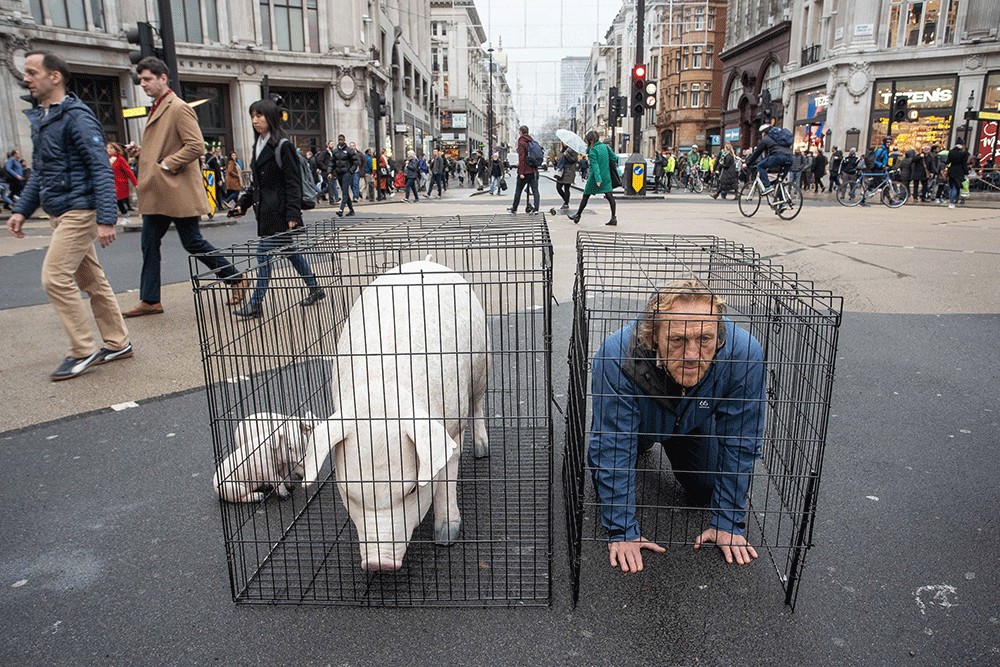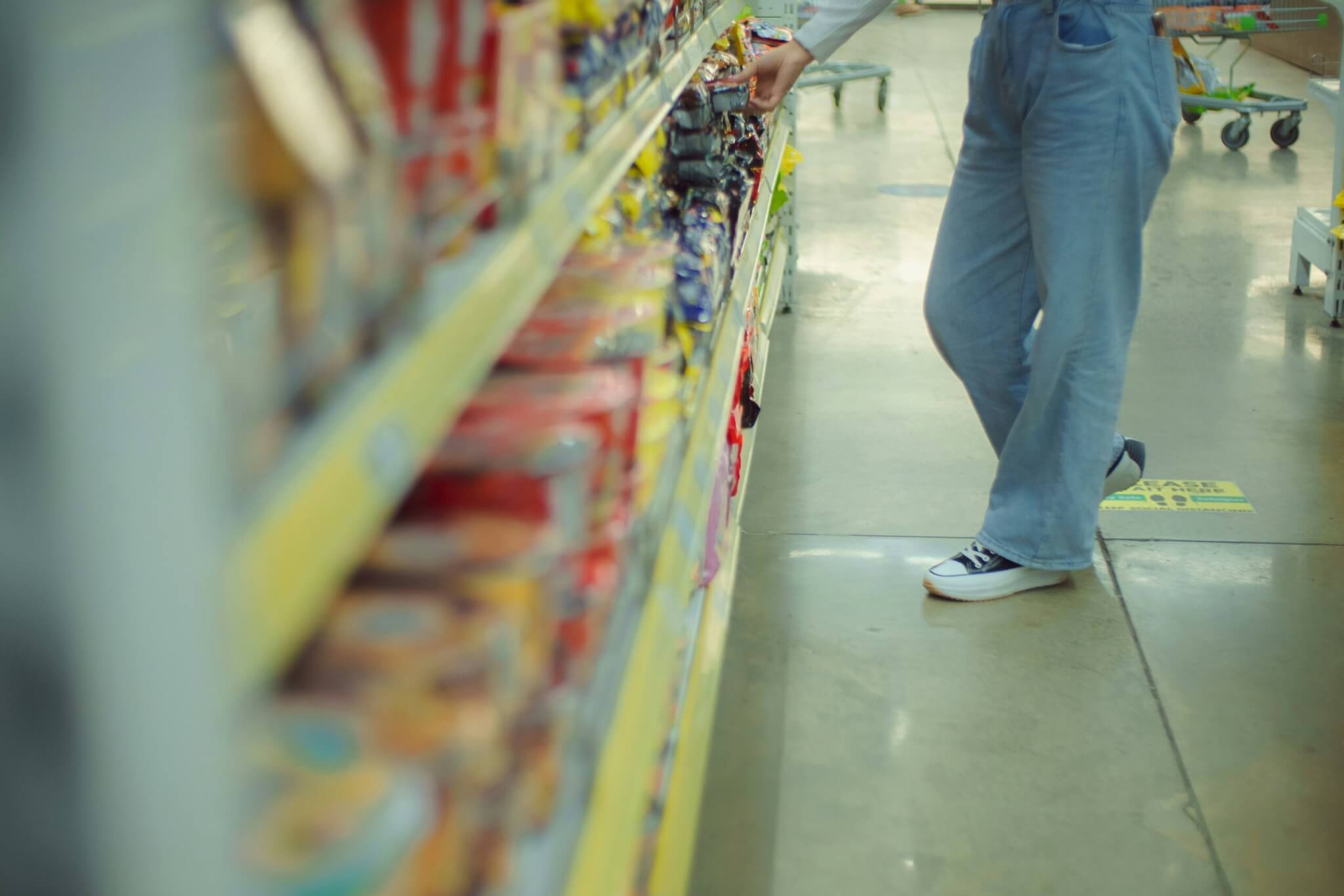A Game of Thrones actor has crouched in a metal cage in London’s busy Oxford Circus to highlight the “horrific” welfare standards of factory-farmed pork and urge food retailers to stop buying from factory farms.
Jerome Flynn, who plays Bronn in the award-winning TV series, is backing calls for people to sign a letter addressed to supermarket and food chain CEOs including Tesco, Morrisons and Greggs, urging them to source only high welfare pork across own brand ranges.
Flynn said: “Factory farming is one of the most horrific examples of how far we have strayed from our hearts in the relentless drive for profit. We call on all our major retailers to do the right thing and lead the way by ceasing to trade in any meat that isn’t high welfare.
“I call on anyone with a compassionate heart to send a strong message to our government and our supermarkets by refusing to buy any factory farmed meat.”

Flynn also fronts a video that shows some of the conditions factory-farmed pigs are kept in, with other videos due to be released to demonstrate the alternative high-welfare systems and the value of real farms over factories.
The stunt is part of a campaign called ‘Pigs in Chains’ by non-profit campaign group Farms not Factories to highlight the poor pig welfare standards in many supermarket and high street food chain supply chains.
In a survey of 60 high street retailers, three quarters were found to be selling pork from factory farms, with the majority not offering a high-welfare alternative.
At the top of the list for high animal welfare on pork were organic box company Riverford, local sourcing delivery company Farmdrop and organic retailer Whole Foods, while at the bottom were chains including Zizzi, Wagamama, Ask Italian and Wetherspoons.

The survey rated retailers on the level of welfare certification they had for pork sourcing, with organic and free range regarded as ‘high welfare’, RSPCA-assured and outdoor-reared as ‘improved welfare’, and Red Tractor, standard UK or standard EU, or no policy, regarded as ‘low welfare’.
Farms not Factories classifies factory farms as intensive systems that are permitted by the Red Tractor labelling scheme, where animals live indoors in overcrowded and cramped conditions, and female pigs are kept in controversial sow pens.
Founder Tracy Worcester said: “As consumers we can all help end the horrors of factory farming, which causes endemic animal suffering by cramming pigs into barren concrete cages, spreads excessive slurry and nitrates destroying ecosystems and undercutting smaller scale family farms. Only buy RSPCA-assured, free range or best of all organic.”
Farms Not Factories is also calling on the UK government to ban the importation of pork produced in conditions that would be illegal in the UK.













I would urge everyone to watch Liz Bonnin’s documentary on the BBC – Meat: A Threat to Our Planet?
It makes very uncomfortable viewing but we need to face up to this issue in much the same way as the plastics debate because it isn’t just about animal welfare, its also about deforestation, habit loss and climate change.
https://www.bbc.co.uk/iplayer/episode/m000bqsh/meat-a-threat-to-our-planet
I don’t believe that giving up meat will save the planet. Our soil needs organic manure to live. Soil that only receives chemical fertiliser shrinks and gradually becomes less fertile so the wildlife finds it increasingly difficult to find food. The use of mixed farming combined with crop rotation means that the land gets properly fed. It’s not enough to fight for animal welfare we need to fight for the welfare of the land our arable crops are grown in a sustainable way rather than relying on chemicals. For myself I do the best I can to feed my family on organic food and I grow what I can. Cheap food is unlikely to have been grown in sustainable way.
I would certainly agree marriedBrit – what you have said has been true since man first started farming and will always be the case. The problem is the unnatural practice of factory farming has resulted in an abundant supply of very cheep meat at the expense of the environment and animal welfare.
As individuals we can make sure that we buy our meat from sustainable sources, cut the amount we eat and show respect for the animals we eat.
Great to hear you are choosing to support ways of growing food that work with nature, not against it – hopefully many more will follow suit.
fertility can and does come from veganic growing, its a reality
The sad thing I find about the above picture of Jerome Flynn in that cage with his companion alonside is the complete indifference of the passersby who, it seems hardly notice their (Piggy Co) existence, that I’m afraid is one of the biggest problems to face – people can talk about these things and often do but their action in their lives proves otherwise – it those people acually cared they could and I’m sure would be standing by those cages screaming and shouting!
the Walrus
Hopefully as with climate change the awareness around this will grow and action will be taken for better animal welfare and sustainable food production that works with nature not against it – currently, organic farming is a great choice consumers can make to support both.
A better choice would be veganics
Liz Bonnin’s programme was certainly hard hitting but contained little reference to our farms. Was that not to upset our farmers. It certainly is a difficult issue and the debate rages on.
The problem is that in 2020 with the impending US trade deal there will be a lot of pressure from the US to take far more of their agricultural products, This can only be bad news for our farmers who may feel compelled to go down the factory farm route to compete.
The first time I heard about factory farming of pigs was in Annie Proux’s book ‘That Old Ace in a Hole’ (2002) demonstrating the owners of ‘hog’ farms moving their farms to different locations as they polluted the land. See here also the article: A million tons of faeces and an unbearable stench:life near industrial pig farms(‘Guardian’ 20/09/17). I just hope we can stamp out any cruelty and land pollution in UK, our water courses are polluted enough as it is.
This weeks news from the farm was from Peter Richardson from Wiske Farm Yorkshire, he seemed proud of using pig waste to generate gas. I would like to know what he puts in his digester? I feel it would not be practical to collect pig poo from out side and if he had a dead pig does that go in as well. Riverford should start thinking Veganic!
Intensive farming is extremely cruel and as it is hidden farming I do believe so many are unaware. When I talk to my family to try and raise awareness they really believe that the pigs they see outside with the huts the meat they are eating. When I say that isn’t the norm they stick their heads in the sand because they don’t want to face reality. I’ve recently turned to a plant based diet because being aware I just can’t support the meat industry. I know a broiler chicken farmer and the things I hear aren’t good and they blame the chickens rather than the farming methods – oh the lies we tell ourselves to make our actions morally sound in our heads!